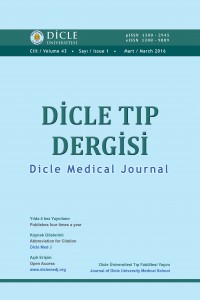Abstract
Objective: Obstructive sleep apnea syndrome (OSAS) adversely affects school performance by causing learning difficulties, attention deficit, and forgetfulness. Aim of this study is to compare two student groups with different school success levels by symptoms related with OSAS.
Methods: First class students from a faculty of our university with relatively higher university entrance examination scores (Group 1) and the ones from another faculty with lower scores (Group 2) were included in study. A questionnaire was applied. Demographic features, information related with smoking, driving, and previous traffic accidents were recorded. Additionally, Epworth Sleepiness Scale and Berlin Questionnaire used in OSAS screening were scored. Findings of two groups were compared.
Results: 252 students were included. Group 1 and 2 consisted of 136 and 116 students, respectively. No difference was determined by age, sex, weight, and height. Significantly higher prevalence of snoring (87.1% vs.27.2%), sleep apnea (10.3% vs.5.1%), daytime sleepiness (25.8% vs.13.2%), and frequency of smoking (25.3% vs.18.2%) were determined in Group 2 than in Group 1 (p<0.001, p=0.021, p=0.002,and p<0.001,respectively). Group 2 also had higher Epworth Sleepiness Scales (5.3±3.5 vs.1.8±3.6,p=0.006) and higher prevalence of OSAS risk (45.7% vs.31.6%,p<0.001). Within Group 2, frequencies of snoring and sleep apnea were higher in smokers than in non-smokers [(97.8% vs.20%,p<0.001) and (68.9% vs.6.7%,p=0.047),respectively].
Conclusions: The prevalence of smoking and symptoms related with OSAS were found higher in students with lower school performance. Given that one of the factors affecting school success in young adults is sleep breathing disorders including OSAS, more comprehensive studies in this field are warranted.
Keywords: Obstructive sleep apnea syndrome, students, school performance, Epworth Sleepiness Scale, Berlin Questionnaire
Keywords
Obstrüktif uyku apne sendromu öğrenci okul performansı Epworth uykululuk ölçeği Berlin anketi
References
- Arıtürk Atılgan Z, Abakay A, Ülgen S. Obstructive sleep apnea syndrome and cardiovascular problems Dicle Med J 2011;38:253-256.
- Yarlagadda A, Kaushik S, Clayton AH. Obstructive sleep apnea,
- hypoxia, and metabolic syndrome in psychiatric and nonpsychiatric settings. Psychiatry 2008;5:48-50.
- Engleman HM, Kingshott RN, Martin SE, Douglas NJ. Cognitive function in the sleep apnea/hypopnea syndrome (SAHS). Sleep 2000;23:102-108.
- Tonetti L, Fabbri M, Filardi M, et al. Effects of sleep timing, sleep quality and sleep duration on school achievement in adolescents. Sleep Medicine 2015. [Internet]. 2015 March 30 [cited 2015 May 15]; Availablefrom: http://dx.doi. org/10.1016/j.sleep.2015;03:026.
- Millman RP. Excessive sleepiness in adolescents and young adults: causes, consequences, and treatment strategies. Pediatrics 2005;115:1774-1786.
- Leach J, Olson J, Hermann J, Manning S. Polysomnographic and clinical findings in children with obstruc- A.A. Kargoshaie et al. 258 tive sleep apnea. Arch Otolaryngol Head Neck Surg 1992;118:741-744.
- Beebe DW, Ris MD, Kramer ME, et al. The association between sleep disordered breathing, academic grades, and cognitive and behavioral functioning among overweight subjects during middle to late childhood Sleep 2010;33:1447-1456.
- Shin C, Kim J, Lee S, et al. Sleep habits, excessive daytime sleepiness and school performance in high school students. Psychiatry Clin Neurosci 2003;57:451–453.
- Guilleminault C, Pelayo R, Ledger D, et al. Recognition of sleep disordered breathing in children. Pediatrics 1996;98:871-887.
- Johns MW. A new method for measuring daytime sleepiness:
- the Epworth sleepiness scale. Sleep. 1991;14:540-545.
- Netzer NC, Stoohs RA, Netzer CM, et al. Using the Berlin Questionnaire to identify patients at risk for the sleep apnea syndrome. Ann Intern Med 1999;131:485-491.
- Schwab RJ, Goldberg AN, Pack AL. Sleep apnea syndromes. In: Fishman AP (ed). Fishman’ s Pulmonary Diseases and Disorders. New York: McGraw - Hill Book Company, 1998;1617-1637.
- Dacal Quintas R, Tumbeiro Novoa M, Alves Perez MT, et al. Obstructive sleep apnea in normal weight patients: characteristics and comparison with overweight and obese patients. Arch Bronconeumol 2013;49:513-517.
- Young T. Analytic epidemiology studies of sleep disordered breathing--what explains the gender difference in sleep disordered
- breathing? Sleep. 1993;16:1-2.
- Young T, Palta M, Dempsey J, et al. The occurence of sleep disordered breathing among middle-aged adults. N Eng J Med 1993;328:1230-1235.
- Chesson AL Jr, Ferber RA, Fry JM, et al. The indications for polysomnography and related procedures. Sleep 1997;20:423-487.
- Porebska I, Kosacka M, Choła J, et al. Smoking among patients
- with obstructive sleep apnea syndrome--preliminary report. Pol Merkur Lekarski 2014;37:265-268.
- Wetter DW, Young TB. The relation between cigarette smoking
- and sleep disturbance. Preventive Med 1994;23:328-334.
- Önerbay Çelik A, Işık AÜ, Ural A, et al. Prevalence and risk factors of snoring, obstructive sleep apnea symptoms, and excessive aytime somnolence in Trabzon. KBB-Forum 2010;9:78-87.
- Wetter DW, Young TB, Bidwell TR, et al. Smoking as a risk factor for sleep-disordered breathing. Arch Intern Med 1994;154:2219-2224.
- Kashyap R, Hock LM, Bowman TJ. Higher prevalence of smoking in patients diagnosed as having obstructive sleep apnea. Sleep Breath 2001;5:167-172.
- Malow BA. Approach to the patient with disordered sleep In: Kryger MH, Roth T, Dement WC, eds. Principles and Practice of Sleep Medicine. 4th Ed. Philadelphia, WB Saunders. 2005;589-593.
- Chung F, Yegneswaran B, Liao P, et al. Validation of Berlin Questionnaire and American Society of Aneesthesiologist checklist as screening tools for obstructive sleep apnea in surgical patients. Anesthesiology 2008;108:822-830.
- Kuppersmith RB. Pediatric obstructive sleep apnea. Department
- of Otolaryngology, University of Texas Medical Branch. Grand Rounds, 1996. Available from; URL:http:// www.bcm.tmc.edu/oto/grand/121996.htm].
- Cutler MJ, Hamdan AL, Hamdan MH, et al. Sleep apnea: from the nose to the heart. J Am Board Fam Pract 2002;15:128-141.
- Gozal D. Sleep-disordered breathing and school performance
- in children. Pediatrics 1998;102:616-620.
Details
| Primary Language | Turkish |
|---|---|
| Journal Section | Research Articles |
| Authors | |
| Publication Date | March 1, 2016 |
| Submission Date | March 29, 2016 |
| Published in Issue | Year 2016 Volume: 43 Issue: 1 |

